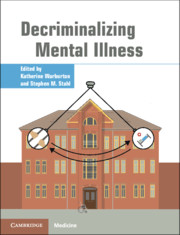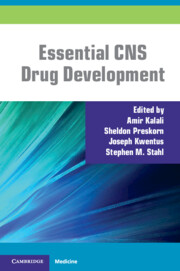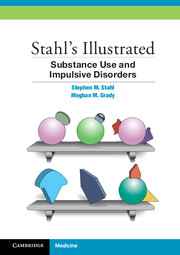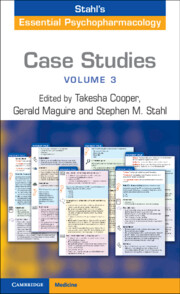
Decriminalizing Mental Illness
- Editors:
- Katherine Warburton, University of California, Davis
- Stephen M. Stahl, University of California, San Diego
- Date Published: January 2021
- availability: In stock
- format: Paperback
- isbn: 9781108826952
Paperback
Other available formats:
eBook
Looking for an inspection copy?
This title is not currently available on inspection
-
Reports reveal an increase in the number of individuals with serious mental illness in jails, prisons and forensic hospitals. Despite the wide-ranging and devastating consequences of this 'criminalization' of mental illness, there remains a lack of information on the subject as well as on the provision of care for these patients. This important new book fills a gap in the literature by examining topics such as: the history and policy factors related to criminalization; original research on forensic populations; pharmacological and psychological treatment strategies; and principles and guidelines for diversion out of the criminal justice system. Contributions from leading experts in the field further our understanding of this important subject, offering advice on how to provide humane care for patients. A must have for all mental health clinicians including psychiatrists, psychologists, social workers, rehabilitation therapists, and mental health nurses. A useful tool for mental health administrators and policy makers.
Read more- Covers the topic of criminalization from social, research and clinical perspectives enabling the reader to understand the origin and scope of the problem, as well as the current state-of-the-art for clinical intervention
- nternational experts provide a comprehensive, global understanding of the topic alongside original research projects that contribute quantitative data
- Provides guidelines for clinicians for treating complex forensic patients in the community and the inclusion of psychopharmacological strategies is ideal for prescribers looking for practical ways to support decriminalization
Reviews & endorsements
'This book is designed for practitioners and those training to enter the field and could be used as a textbook for courses on mental illness and the criminal justice system … Recommended.' W. R. Pruitt, Choice Connect
See more reviewsCustomer reviews
Review was not posted due to profanity
×Product details
- Date Published: January 2021
- format: Paperback
- isbn: 9781108826952
- length: 406 pages
- dimensions: 246 x 190 x 19 mm
- weight: 0.9kg
- availability: In stock
Table of Contents
List of Contributors
Part I. Introduction/Description of the Problem:
1. Balancing the Pendulum: Rethinking the Role of Institutionalization in the Treatment of Serious Mental Illness
2. Deinstitutionalization and Other Factors in the Criminalization of Persons with Serious Mental Illness and How it Is Being Addressed
3. A Brief History of the Criminalization of Mental Illness
4. A Social History of Psychotic Illness
5. Forensic Patients in State Psychiatric Hospitals:
1999-2016
6. A Survey of National Trends in Psychiatric Patients found Incompetent to Stand Trial: Reasons for the Re-Institutionalization of People with Serious Mental Illness in the United States
7. Forensic Psychiatry and Mental Health in Australia: An Overview
8. Community Forensic Psychiatric Services in England and Wales
9. A Longitudinal Description of Incompetent to Stand Trial Admissions to a State Hospital
Part II. Solutions:
10. Jail Diversion: The Miami Model
11. Jail Diversion: A Practical Primer
12. Principles and Practices of Risk Assessment in Mental Health Jail Diversion Programs
13. Decriminalization in Action: Lessons from the Los Angeles Model
14. Economics of Decriminalizing Mental Illness: When Doing the Right Thing Ironically Costs Less
15. Decriminalising Severe Mental Illness by Reducing Risk of Contact with the Criminal Justice System, Including for Forensic Patients
16. The Cal-DSH Diversion Guidelines
17. Decriminalizing Mental Illness: Specialized Policing Responses
18. Dopamine Antagonist Antipsychotics in Diverted Forensic Populations
19. Monitoring and Improving Antipsychotic Adherence in Outpatient Forensic Diversion Programs
20. Pharmacological Treatment of Violence in Schizophrenia
21. Neurocognition and Social Cognition Training as Treatments for Violence and Aggression in People with Severe Mental Illness
22. Examining Violence Among Not Guilty by Reason of Insanity State Hospital Inpatients Across Multiple Timepoints: The Roles of Criminogenic Risk Factors and Psychiatric Symptoms
23. Criminogenic Risk and Mental Health: A Complicated Relationship
24. Implementation of a Specialized Treatment Program to Reduce Violence in a Forensic Population
25. From Trauma-Blind to Trauma-Informed: Re-thinking Criminalization and the Role of Trauma in Persons with Serious Mental Illness Population
26. The Indistinguishables: Determining Appropriate Environments for Justice Involved Individuals
27. Breaking Down Long-Term Chronic Aggression within a Forensic Hospital System
28. Tipping the Scales of Justice: The Role of Forensic Evaluations in the Criminalization of Mental Illness
29. Competency to Stand Trial and Criminalization: An Overview of the Research
30. Risk Factors for Recidivism in Individuals Receiving Community Sentences: A Systematic Review and Meta-Analysis
31. Developing Policies for Adult Sexual Minorities with Mental Health Needs in Secured Settings (Review article)
32. An Overview of Jail-Based Competency Restoration
33. Fixated Threat Assessment Centres: Preventing Harm and Facilitating Care in Public Figure Threat Cases and Those Thought to Be at Risk of Lone-Actor Grievance-Fuelled Violence
34. Decriminalizing LGBTQ+: Reproducing and Resisting Mental Health Inequities
35. Building a Therapeutic Relationship between Probation Officers and Probationers with Serious Mental Illnesses
36. Length of Stay for Inpatient Incompetent to Stand Trial (IST) Patients: Importance of Clinical and Demographic Variables
37. Severe Mentally Ill Patients: Our Global Migrants: Neuroethical Issues in Psychiatry and Pharmacology Today: A Brief Manifesto towards The World Symposium 2021
Index.
Sorry, this resource is locked
Please register or sign in to request access. If you are having problems accessing these resources please email [email protected]
Register Sign in» Proceed
You are now leaving the Cambridge University Press website. Your eBook purchase and download will be completed by our partner www.ebooks.com. Please see the permission section of the www.ebooks.com catalogue page for details of the print & copy limits on our eBooks.
Continue ×Are you sure you want to delete your account?
This cannot be undone.
Thank you for your feedback which will help us improve our service.
If you requested a response, we will make sure to get back to you shortly.
×


































